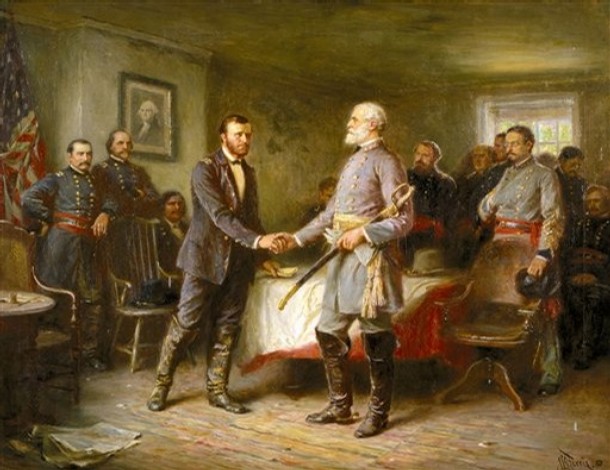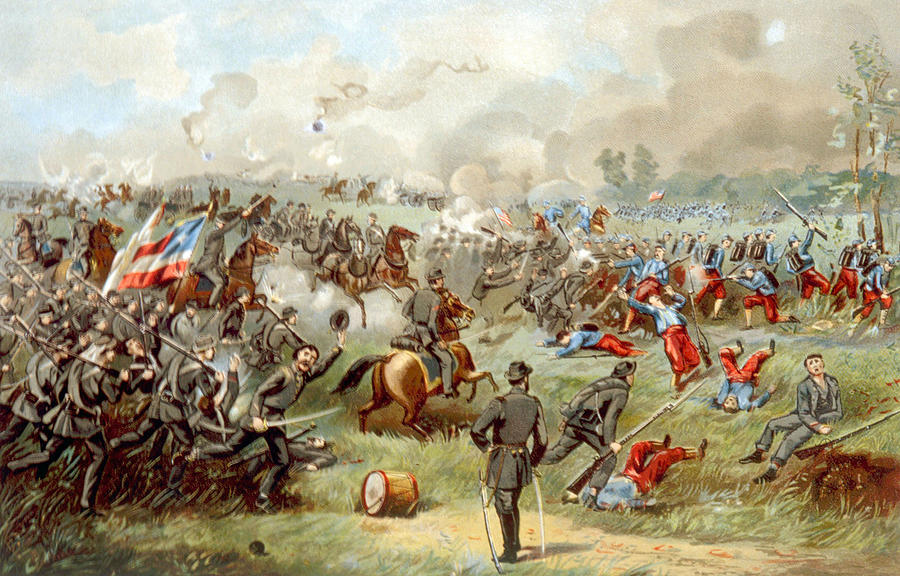 |
| http://www.rampartsofcivilization.com/?__&paged=19 |
Hello
Thursday, January 30, 2014
Surrender and immediate aftermath
Andersonville
Andersonville was one of the South's biggest prisons, if not the biggest. The rebel officers would issue small rations for the men, but only once a day. The prisoners had little to look forward to but this. The prisoners also couldn't have much firewood, just some small twigs to heat up and boil food. The prison camp's standards were terrible, and the mortality rate showed this. About to 30-50 northern prisoners died a day. There was very low morality and most men felt deserted because the northerners just left them there. Many died and few survived to be eventually freed at the end of the war.
| https://www.advrider.com/andersonville/now |
Monday, January 27, 2014
Sherman's Atlanta campaign and march to the sea
General Grant, now with a foothold and supply line in Georgia, decided to
send in his friend General Sherman to ravage all of Georgia and South Carolina.
This new battle tactic was to burn and destroy cities, towns, and houses in in
order to demoralize southerners, and want for the war to stop. Not only this,
but it would take away one of the South's crown jewels, Atlanta. They would
tear up the confederate rail lines in Atlanta, and effectively ruin the South’s
rail road complexes. This campaign would also secure Lincoln's reelection
coming up in 1864. After General Sherman secured Atlanta, he burned 30% of it to
stop it from being reused for military purposes, and went away. He continued
this tactic, now called total war, throughout his long march to Savanna. He
claimed Savanna peacefully, only because it immediately surrendered. After
taking Savanna, he continued north into South Carolina, where his men were even
more brutal in his new total warfare tactic.
| http://people.cohums.ohio-state.edu/grimsley1/dialogue/long_shadow.htm |
Chickamauga and Chattanooga and the Union blockade
 |
| http://en.wikipedia.org/wiki/Battle_of_Chickamauga |
Tuesday, January 21, 2014
Gettysburg
By 1863, the Confederacy was slowing down. Farms in
the south were failing because of the increasing amount of escaping slaves and
the fact that it was impossible to export products of high demand with the
Union's blockade of southern ports. Because of this, they also couldn't receive
any, now exhausted, supplies, and because of this soldier’s morale went down
and increasingly deserted the army. Lee hoped that a win in the north could
gain foreign recognition to aid the needy south. On July 1, 1863 the two major
forces met at Gettysburg, Pennsylvania. This proved to be the bloodiest battle
of the war with over 50,000 casualties and deaths. Lee's army was repelled and
retreated to Virginia. It was a major win for the north and it devastated Lee's
already battered army. It was the turning point of the war, and the union
gained the upper hand after that.
 |
| http://froggyradio.com/content/polly-woggs-pond/post/150th-anniversary-battle-gettysburg |
Monday, January 20, 2014
Antietam and the Emancipation Proclomation
After Lee's major victory at the second battle of Bull Run,
he decided to invade the north and get another big victory. If he got this huge
victory, Brittan and France would've recognized the Confederacy as its own country.
And if this happened, than the countries could send extra troops, supplies, and
more to help the south. It would also send a crushing blow to the North’s
morale and war efforts. Unfortunately for him, one of his commanders dropped
Lee's battle plan, and it got picked up by McClellan. He found out that Lee
split his forces and wanted to invade the north. This gave them a huge
advantage. The 2 forces met at Sharpsburg, Maryland in the bloodiest single day
of combat in the entire war. Over 22,000 were either killed or wounded. The confederate
forces were repelled, and McClellan didn't pounce on the rebels to gain ground.
Although it was a tie, it hugely boosted the union soldiers. After this draw,
Lincoln thought it was time to free the slaves. He wanted to wait for the right
time to free them because he was scared that he might lose the Border States,
upset the constitutional rights of the people, and other less important
reasons. He ended up freeing the slaves with his famous Emancipation Proclamation.
He only freed the slaves in the rebelling states to keep the Border States on
his side. It was a momentous decision and it ended up helping the north because
of all the freed slaves that signed up for the north.
| http://thecivilwarparlor.tumblr.com/post/39389925382/150th-anniversary-of-the-battle-of-antietam |
Friday, January 17, 2014
Confederate and union strengnths and weaknesses and first battles
The confederation and union had very diverse economies, strengths, and weaknesses. The union strengths at the time of the civil war were their huge population, strong industries to support the war, blacks to fight with them, railroads, telegrams, a good navy, and more. Their weaknesses included bad generals, the fact that they had to invade the south, and more. The south's strengths included amazing generals, moralized troops defending their homeland, and better armies. Their weaknesses were that they had fewer troops, missed some opportunities to win, were less technologically advanced, had worse weaponry, and more. Although the strengths and weaknesses gave the north a slight advantage, both sides thought themselves superior. Fort Sumpter was a union outpost controlling the Charleston river port. Rebel forces overtook the fort and freed themselves. This angered the northerners and caused many of them to sign up for the war. Many southerners also signed up to "whoop" the northerners. Northern forces met southerners standing at Bull Run creek, which gave it its name. The two forces clashed along this river for a very bloody battle. This demoralized the troops on both sides and gave signs that the war was going to be a long one.
 |
| http://fineartamerica.com/featured/the-battle-of-bull-run-confederate-everett.html |
Subscribe to:
Comments (Atom)